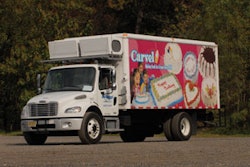Minneapolis: Murphy Warehouse Co. is installing homegrown solar panel technology at three of its Twin Cities warehouse buildings, becoming in the process the largest generator of Minnesota-manufactured solar energy in North America.
The Murphy Warehouse installation marks the first solar installation of its kind by a private business on a warehouse or big box rooftop in Minnesota. The installation is made possible by new technology developed by Minnesota firms, combined with rebate programs that make solar energy affordable for businesses.
“The Minnesota model of innovation is alive and well, this time focused on the effective use of solar energy in this state,” Richard Murphy, CEO of Murphy Warehouse, says. The project involves several Minnesota firms, including manufacturers tenKSolar and 3M, sustainability consultant Sustology, installer Sundial Solar and Murphy Warehouse.
The panels, manufactured by Minneapolis-based tenKsolar, include new Redundant Array of Integrated Solar (RAIS) Wave technology that produces up to 50 percent more energy per square foot than a standard solar PV array. The panels use a 3M-produced reflective coating that reflects the usable solar energy, but disburses heat.
The panels are being installed on the roofs of the company’s Northtown 1 and 2 facilities in Fridley (4700 and 4850 Main St. N.E., respectively) and, later this fall, on the company headquarters in Minneapolis (701 24th Ave. S.E.). The installation on all three buildings will cost an initial upfront investment of $1 million, but thanks to rebates – 60 percent from Xcel Energy’s “Made In Minnesota” program and 30 percent from state and federal government programs – the final cost to Murphy will be just $90,000.
The company expects to save $22,000 annually in energy costs and will recoup its investment within four years. All excess energy generated by Murphy Warehouse will be fed into the energy grid.
“Solar PV technology is more efficient at lower temperatures, so when you combine that with our state’s high number of sun days, Minnesota is first-rate for the generation of solar energy,” says Craig Wilson, CEO of Sustology, the sustainability consultant who developed the solar installation. “If every warehouse and big-box retailer would install solar panels, we could significantly reduce our dependence on coal and nuclear power – and these benefits would accrue to all Minnesotans.”
A commitment to green business practices
Murphy Warehouse is leading the way in reducing the environmental impact of industrial sites through other green business practices, including an award-winning stormwater management system at its Minneapolis headquarters and native prairie plantings on all company properties.
The installation of solar panels on the company’s Northtown 1 and 2 warehouse buildings in Fridley comes as both have earned LEED Gold Certification, a rating system that allows building owners/operators to maximize a facility’s “operational efficiency while minimizing environmental impacts.” (U.S. Green Building Council: 2010). Murphy Warehouse is currently in the process of LEED certifying its other Fridley location and Minneapolis headquarters, as well.
According to Wilson, who also administered the LEED certification, Murphy Warehouse has operated both buildings with an eye toward sustainability since they opened in 1992.
“They’ve done it all: installed energy efficient lighting systems, a stormwater management system and prairie plantings; developed a sound recycling and waste management policy, and even used ‘green’ cleaning products,” Wilson notes. These sites will likely see additional certifications, including a “99” Energy Star Rating and ISO 14001, awarded later this fall, he says.
Fourth generation leader of Murphy Warehouse Company, Richard Murphy has an even bigger vision of what’s possible. “With more than five billion square feet of warehouse space in the U.S., just imagine what kind of impact it would have if all industrial warehouse sites supplied solar power and were run in an environmentally friendly way,” he says. “That’s a four-foot wide walkway from here to the moon.
“The cost savings alone justifies the effort. But even more important, it’s the right thing to do.”



















